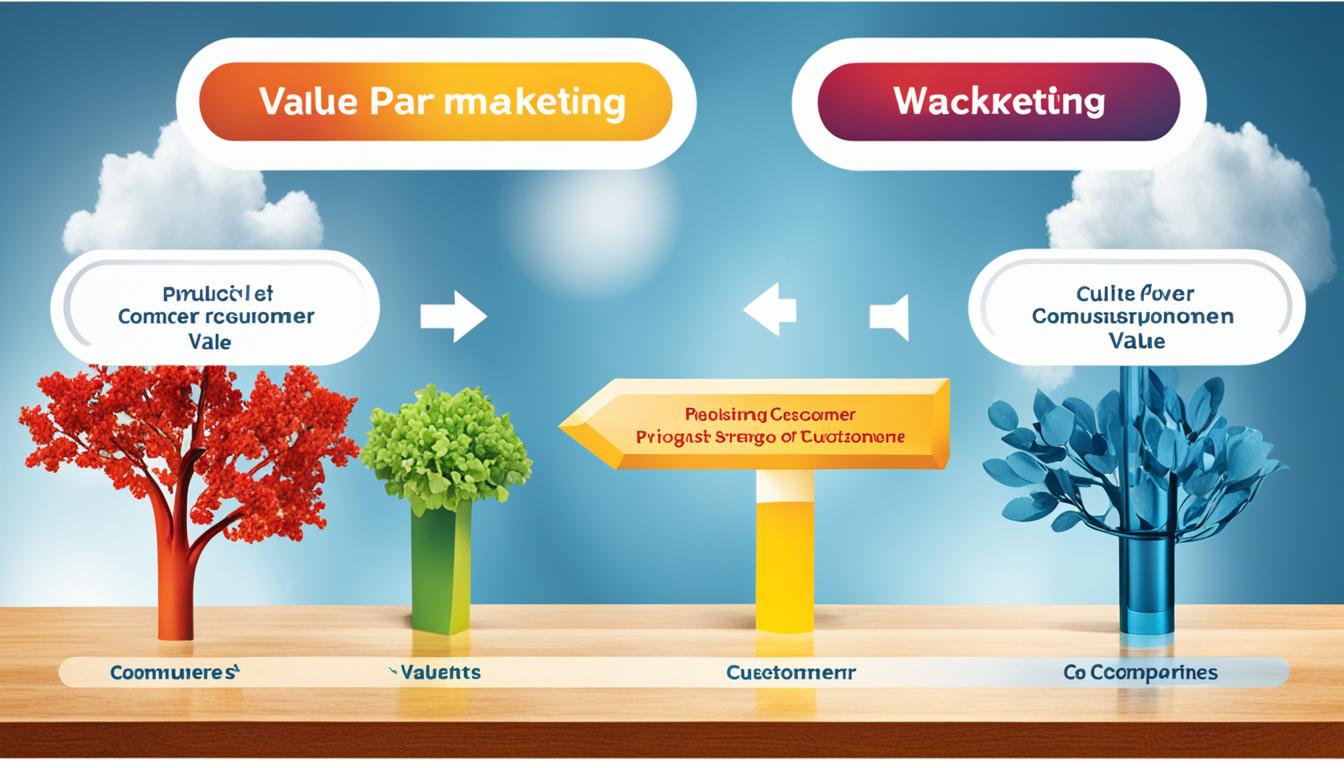Entrepreneurial marketing is a vital aspect of business success for entrepreneurs and startups. It encompasses strategic marketing initiatives, digital marketing techniques, and effective branding strategies tailored to the unique needs and challenges of entrepreneurial ventures. Implementing the right marketing strategies can help entrepreneurs reach their target market, build brand awareness, generate leads, and ultimately drive business growth.
Digital marketing for entrepreneurs has become especially crucial in the modern business landscape, where online presence and visibility can make or break a startup’s success. With the right tactics, such as social media marketing, content creation, and search engine optimization, entrepreneurs can leverage the power of the internet to connect with their target audience and establish a strong online presence.
Effective marketing for entrepreneurs is not limited to large budgets or extensive resources. In fact, small business marketing often thrives on resourcefulness and creativity, finding innovative ways to reach the right audience without breaking the bank. It’s about understanding the target market, crafting a compelling promotional message, and utilizing various marketing channels to deliver that message effectively.
Branding is another essential aspect of entrepreneurial marketing. Building a strong brand identity and reputation helps entrepreneurs differentiate themselves from the competition and gain the trust and loyalty of their target audience. By effectively communicating their unique value proposition and telling authentic stories, entrepreneurs can establish a strong brand presence that resonates with their customers.
In this article, we will explore different entrepreneurship marketing strategies and provide examples of successful marketing campaigns carried out by entrepreneurs. We will also discuss the importance of marketing in entrepreneurship and how it can help entrepreneurs reach their target market, build brand awareness, generate leads, differentiate from the competition, and drive business growth.
Key Takeaways:
- Entrepreneurial marketing is crucial for the success and growth of startups and small businesses.
- Digital marketing plays a significant role in reaching the target market and establishing an online presence.
- Effective marketing for entrepreneurs relies on resourcefulness, creativity, and understanding the target audience.
- Branding helps entrepreneurs differentiate themselves and build trust and loyalty with their customers.
- This article will explore various entrepreneurship marketing strategies and provide examples of successful campaigns.
Importance of Marketing in Entrepreneurship
Marketing plays a critical role in the success and expansion of a business venture. It is the driving force behind revenue generation, brand awareness, and competitive advantage for entrepreneurial firms. Effective marketing strategies enable entrepreneurs to reach their target market effectively, generate leads, and drive sales. Without a solid marketing strategy, businesses can struggle to gain traction and fail to generate the necessary revenue for growth and sustainability.
Entrepreneurship, by its very nature, involves taking risks and pursuing innovative ideas. Marketing helps entrepreneurs navigate these challenges by creating and maintaining demand for their offerings. By implementing strategic marketing initiatives, entrepreneurs can raise awareness of their products or services, communicate their unique value proposition, and ultimately attract and retain customers.
The Role of Marketing Strategy
A well-defined marketing strategy is a vital component of successful entrepreneurship. It acts as a roadmap, guiding entrepreneurs in identifying their target market, understanding customer needs and preferences, and positioning their offerings effectively. A comprehensive marketing strategy encompasses key areas such as market research, brand development, product promotion, and customer relationship management.
Revenue Generation
Marketing directly contributes to revenue generation by attracting customers and driving sales. Through targeted advertising campaigns, engaging content creation, and persuasive messaging, entrepreneurs can capture the attention of potential customers and entice them to purchase their products or services.
Gaining a Competitive Advantage
In a competitive business landscape, standing out from the crowd is crucial. Marketing allows entrepreneurs to differentiate their offerings from competitors and establish a unique selling proposition (USP). By effectively communicating their USP, entrepreneurs can position themselves as the preferred choice among target customers, gaining a significant competitive advantage.
Building Brand Awareness and Reputation
Creating brand awareness is essential for the long-term success of any business. Through strategic marketing efforts, entrepreneurs can increase their brand visibility, promote their products or services, and foster a positive brand reputation. A strong brand presence not only strengthens customer trust and loyalty but also serves as a key differentiator in the marketplace.
Effective Marketing Initiatives
Entrepreneurs can leverage a variety of marketing initiatives to achieve their business objectives. These may include:
- Content Marketing: Creating informative and engaging content to attract and engage the target audience.
- Social Media Marketing: Utilizing popular social media platforms to reach and interact with potential customers.
- Email Marketing: Building and nurturing relationships with customers through targeted email campaigns.
- Search Engine Optimization (SEO): Optimizing website content to improve organic visibility and drive traffic from search engines.
- Influencer Marketing: Collaborating with influential individuals or groups to promote products or services.
| Marketing Strategy | Description |
|---|---|
| Content Marketing | Creating valuable content to attract and engage the target audience, establishing thought leadership and expertise. |
| Social Media Marketing | Utilizing social media platforms to reach and engage with potential customers, driving brand awareness and customer interaction. |
| Email Marketing | Building and nurturing customer relationships through targeted email campaigns, promoting products and driving sales. |
| Search Engine Optimization (SEO) | Optimizing website content to improve organic search rankings, attracting targeted traffic and increasing visibility in search engines. |
| Influencer Marketing | Partnering with influential individuals or groups to promote products or services, leveraging their audience and credibility. |
Types of Entrepreneurial Marketing Strategies
In entrepreneurial marketing, there are various types of strategies that entrepreneurs can utilize to promote their ventures and reach their target market effectively. These strategies include:
1. Low-Cost Marketing
Low-cost marketing allows businesses to be resourceful and make the most of their limited marketing budget. This strategy focuses on cost-effective tactics that provide maximum impact, such as social media marketing, content creation, and leveraging partnerships with complementary businesses.
2. Direct Marketing
Direct marketing involves establishing a personal connection with the target market. It allows entrepreneurs to reach potential customers directly through methods like email marketing, personalized messages, and telemarketing. This strategy helps build relationships, generate leads, and drive sales.
3. Viral Marketing
Viral marketing aims to promote products or services through viral trends and social sharing. By creating compelling and shareable content, entrepreneurs can gain widespread attention and exposure. Creative campaigns, challenges, and user-generated content are common tactics used in viral marketing.
4. Traditional Marketing
Traditional marketing involves developing product ideas before identifying a target audience. This strategy encompasses more traditional channels such as print advertisements, television commercials, billboards, and radio spots. It allows entrepreneurs to reach a broader audience and build brand recognition.
5. Digital Entrepreneurship
Digital entrepreneurship focuses on leveraging digital tools and platforms to drive business growth. It includes strategies such as search engine optimization (SEO), social media marketing, influencer collaborations, and online advertising. Embracing digital entrepreneurship enables entrepreneurs to reach a wider audience, create brand awareness, and drive online sales.
By employing these different marketing strategies, entrepreneurs can effectively promote their ventures, connect with their target market, and achieve their business goals.
Examples of Entrepreneurial Marketing Campaigns
Entrepreneurial marketing campaigns encompass a range of strategies that can propel a business forward. By utilizing various channels, entrepreneurs can effectively promote their brand, engage with their target audience, and enhance their reputation. Here are some examples of entrepreneurial marketing campaigns:
1. Word-of-mouth marketing
Word-of-mouth marketing is a powerful tool that relies on satisfied customers spreading positive recommendations about a brand. It harnesses the power of personal referrals, creating trust and credibility for the business. Companies can encourage word-of-mouth marketing by offering exceptional products or services, providing outstanding customer experiences, and implementing referral programs that incentivize customers to refer their friends and family.
2. Email marketing
Email marketing is an effective way to communicate directly with potential customers. By sending targeted emails, entrepreneurs can nurture leads, build relationships, and drive conversions. Email campaigns can include personalized content, special offers, and valuable information that is relevant to the subscribers. To ensure the success of email marketing campaigns, businesses should focus on delivering valuable and engaging content to their audience.
3. Social media marketing
Social media platforms provide entrepreneurs with a vast array of opportunities to reach and engage their target audience. By creating compelling content, participating in conversations, and building a community of loyal followers, entrepreneurs can increase brand visibility and generate leads. Social media marketing allows businesses to showcase their products or services, share industry insights, and create meaningful connections with customers.
4. Public relations
Public relations involves managing the public image and reputation of a brand. Through strategic communication efforts, entrepreneurs can shape public perception, establish credibility, and build strong relationships with the media and influencers. Public relations activities can include press releases, media interviews, event sponsorships, and thought leadership initiatives. By leveraging public relations, entrepreneurs can position themselves as industry leaders and gain wider recognition.
| Entrepreneurial Marketing Campaign Examples | Key Channels |
|---|---|
| Word-of-mouth marketing | Satisfied customers |
| Email marketing | Email campaigns |
| Social media marketing | Social media platforms |
| Public relations | Press releases, media interviews, event sponsorships |
These examples highlight the versatility and effectiveness of entrepreneurial marketing campaigns. By implementing these strategies, entrepreneurs can amplify their brand reach, engage with their target audience, and drive business growth.
Reaching the Target Market
Marketing is a powerful tool that allows entrepreneurs to effectively reach their target market and make their business visible to potential customers. By implementing strategic marketing initiatives, entrepreneurs can promote their products or services to individuals interested in specific niches, such as organic skincare products. Let’s explore how these initiatives can help entrepreneurs raise awareness and connect with their target market.
Strategic Marketing Initiatives
Entrepreneurs can adopt a variety of strategic marketing initiatives to reach their target market. One effective method is advertising in relevant magazines or publications that cater to individuals interested in organic skincare products. This allows entrepreneurs to tap into a pre-existing audience that already has an interest in the niche.
Another powerful initiative is establishing an online presence. With the rise of e-commerce and digital platforms, entrepreneurs can leverage websites and social media channels to connect directly with their target market. Building an engaging website that showcases organic skincare products and their benefits can attract potential customers and drive traffic to the business.
Additionally, social media platforms present a cost-effective way to engage with the target market. By creating compelling content and running targeted ad campaigns, entrepreneurs can increase brand awareness among individuals interested in organic skincare products.
Raising Awareness for Organic Skincare Products
One of the main goals of strategic marketing initiatives is to raise awareness for organic skincare products. Entrepreneurs can educate their target market about the benefits of using organic and natural ingredients and highlight the potential risks associated with conventional skincare products.
To effectively communicate the advantages of organic skincare products, entrepreneurs can leverage content marketing strategies. This can include creating informative blog posts, videos, or social media posts that discuss the benefits of organic ingredients, share testimonials from satisfied customers, and provide valuable skincare tips.
By consistently sharing educational and engaging content, entrepreneurs can position themselves as thought leaders in the organic skincare industry. This helps build trust, credibility, and loyalty among the target market, increasing the likelihood of conversion and repeat business.
Comparison of Strategic Marketing Initiatives
| Initiative | Advantages | Disadvantages |
|---|---|---|
| Advertising in relevant magazines | – Targets a specific audience interested in organic skincare products – Builds brand visibility |
– Costly, especially for popular magazines – Limited to print circulation |
| Establishing an online presence | – Wide reach and accessibility – Cost-effective compared to traditional advertising – Enables direct interaction with the target market |
– Requires consistent content creation and management – Competitive online landscape |
| Utilizing social media platforms | – Cost-effective – Allows targeting specific demographics – Facilitates engagement and communication with the target market |
– Requires continuous content creation and management – Algorithm changes may affect organic reach |
By adopting strategic marketing initiatives and raising awareness for organic skincare products, entrepreneurs can effectively connect with their target market, establish brand visibility, and generate interest in their products or services. The next section will explore how building brand awareness can further contribute to the success of an entrepreneurial venture.
Building Brand Awareness
Building brand awareness is a pivotal step in establishing trust and loyalty among customers. By implementing effective marketing strategies, entrepreneurs can enhance brand recognition and create a strong presence in the market. This section will explore various approaches to building brand awareness and how they can benefit businesses.
1. Creating a Strong Online Presence
In today’s digital age, having a website and social media pages is essential for building brand awareness. Entrepreneurs can optimize their websites for search engines, ensuring they appear at the top of relevant search results. Additionally, active engagement on social media platforms can help businesses connect with their target audience and showcase their unique value proposition.
2. Distributing Flyers and Promotional Materials
Offline marketing tactics, such as distributing flyers and promotional materials, remain effective in raising brand awareness. By strategically placing flyers in high-traffic areas or distributing them during community events, entrepreneurs can reach a wide range of potential customers.
3. Offering Special Promotions and Discounts
Special promotions and discounts are an excellent way to capture customers’ attention and entice them to try out products or services. By offering exclusive deals, entrepreneurs can generate buzz and encourage word-of-mouth marketing, further expanding brand reach.
4. Partnerships and collaborations
Collaborating with complementary businesses or influencers can significantly boost brand awareness. By leveraging the existing customer base of partnered brands, entrepreneurs can expand their reach and gain exposure to new audiences.
5. Customer Testimonials and Reviews
Positive customer testimonials and reviews are valuable assets in building brand awareness. Entrepreneurs can actively collect feedback from satisfied customers and showcase them on their website or social media platforms. This helps build trust and credibility among potential customers.
Overall, building brand awareness requires a combined effort of online and offline marketing strategies. By utilizing a mix of digital platforms, offline promotional materials, partnerships, and customer testimonials, entrepreneurs can establish a recognized and trusted brand in their respective markets.
| Benefits of Building Brand Awareness | Examples |
|---|---|
| Increased trust and loyalty from customers | Customer retention and repeat business |
| Elevated brand reputation and recognition | Brand becoming synonymous with a particular service or product |
| Opportunities for differentiation from competitors | Targeting a specific niche market |
| Expanded customer reach and market presence | Growing customer base and revenue |
Generating Leads and Driving Sales
One of the primary objectives of entrepreneurial marketing is to generate leads and convert potential customers into loyal, paying clients. Effective marketing strategies enable entrepreneurs to engage with their target audience and drive sales through various channels, including advertising, public relations, and social media campaigns.
When it comes to lead generation, entrepreneurs employ a diverse range of tactics to capture the interest and attention of potential customers. By leveraging advertising campaigns, businesses can reach a wider audience and attract individuals who may have a genuine need or interest in their products or services. For instance, a software company may choose to sponsor industry conferences or attend trade shows to generate leads and engage with potential clients.

Converting potential customers into sales requires more than just capturing their attention; it involves building trust, showcasing value, and addressing their pain points. Public relations initiatives can play a crucial role in fostering credibility and establishing a positive reputation for a brand. Entrepreneurs may engage in activities such as press releases, media features, or thought leadership to position themselves as industry experts and gain the trust of potential clients.
Social Media Campaigns
Social media has become an integral part of entrepreneurial marketing strategies, providing entrepreneurs with a platform to engage with their target audience, promote their products or services, and drive sales. With the vast reach and targeting capabilities of social media platforms, entrepreneurs can create highly tailored campaigns that resonate with their audience.
Social media campaigns can take various forms, from compelling visual content to interactive quizzes or giveaways. By leveraging the power of social media influencers and utilizing targeted advertising, entrepreneurs can increase brand visibility, attract potential customers, and drive sales. Engaging with followers, responding to comments, and analyzing social media metrics are additional strategies entrepreneurs can employ to optimize their social media campaigns.
| Social Media Campaign Tactics | Benefits |
|---|---|
| Creative visual content | Attracts attention and promotes brand recognition |
| Influencer partnerships | Expands brand reach and taps into the influencer’s loyal following |
| Engagement and response | Builds customer trust and loyalty |
| Targeted advertising | Reaches specific demographics and increases conversion rates |
| Analyzing metrics | Provides insights to refine future campaigns and optimize results |
Differentiating from the Competition
Marketing plays a crucial role in helping entrepreneurs distinguish their business from competitors. One effective way to achieve this is by highlighting a unique selling proposition (USP) that sets the venture apart. The USP communicates the distinctiveness and superiority of the product or service, capturing the attention of potential customers.
Entrepreneurs can effectively communicate their USP by emphasizing the personalized approach of their offerings. For instance, a startup specializing in personalized nutritional meal plans can showcase the benefits of tailored meals compared to generic diet plans available in the market. By highlighting the customization and personalization aspect, the startup can showcase its USP and attract health-conscious individuals looking for individualized dietary solutions.
This personalized approach establishes a strong differentiation point, demonstrating to potential customers that the startup understands their unique needs and provides tailored solutions. By effectively communicating the USP through targeted marketing messages, entrepreneurs can position their venture as distinctive and create a competitive advantage in the market.
Benefits of Personalized Nutritional Meal Plans
| Benefits | Description |
|---|---|
| Individualized Nutrition | The personalized nature of the meal plans ensures that each customer receives a dietary plan that caters to their specific nutritional requirements. |
| Optimal Health | By tailoring the meals to the individual’s needs, the personalized meal plans contribute to improved overall health and wellbeing. |
| Convenience | Customers no longer need to spend time and effort planning meals and shopping for ingredients, as everything is prepared and delivered according to their preferences. |
| Weight Management | Personalized meal plans take into account weight management goals, assisting individuals in achieving their desired weight and maintaining a healthy lifestyle. |
By effectively differentiating from the competition through a unique selling proposition, entrepreneurs can attract the attention and interest of their target market. Through personalized marketing messages and a focus on the benefits of their unique offerings, entrepreneurs can establish themselves as industry leaders and foster customer loyalty.
Growing the Business
Marketing is a crucial factor in achieving business success, as it helps entrepreneurs attract more clients and drive revenue growth. By implementing effective digital marketing strategies, entrepreneurs can effectively expand their client base and increase their overall revenue. Let’s explore some key digital marketing strategies that can fuel business growth.
Search Engine Optimization (SEO)
One of the most powerful digital marketing strategies is search engine optimization (SEO). By optimizing their website and content for search engines, entrepreneurs can improve their online visibility and attract organic traffic. This can lead to increased brand awareness, more website visitors, and ultimately, a larger client base.
Social Media Marketing
Social media platforms offer entrepreneurs an excellent opportunity to engage with their target audience and promote their products or services. By creating compelling social media campaigns and sharing valuable content, entrepreneurs can attract new customers, build brand loyalty, and enhance revenue growth. Social media marketing also allows for precise targeting, ensuring that messages reach the most relevant audience.
Content Creation
Creating high-quality content is essential for establishing thought leadership and attracting potential clients. By producing informative blog posts, videos, or podcasts, entrepreneurs can showcase their expertise and gain the trust of their target market. This trust can then translate into increased client acquisition and revenue growth.
Let’s take a closer look at the impact of these digital marketing strategies on business growth:
| Benefits of Digital Marketing Strategies | Impact on Business Growth |
|---|---|
| Increase brand visibility and awareness | Attract more potential clients |
| Improve search engine rankings | Drive more organic traffic to the website |
| Enhance customer engagement and loyalty | Boost repeat business and referrals |
| Establish thought leadership and credibility | Generate trust and attract high-value clients |
| Expand reach and target specific demographics | Tap into new markets and increase client base |
By leveraging digital marketing strategies such as SEO, social media marketing, and content creation, entrepreneurs can unlock their business potential, attract more clients, and experience significant revenue growth. It is essential to continuously adapt and refine these strategies to stay ahead of the competition and drive sustained business growth.

Characteristics of Entrepreneurial Marketing
Entrepreneurial marketing possesses unique characteristics that set it apart from traditional marketing approaches. These characteristics reflect the dynamic and resource-constrained nature of entrepreneurial ventures. Entrepreneurial marketing requires:
- Resourcefulness: Entrepreneurs must be resourceful in order to make the most of their limited marketing budget. They find creative ways to reach their target audience and maximize the impact of their marketing efforts.
- Agility and Adaptability: Entrepreneurs need to be agile and adaptable in their marketing strategies. They must be able to quickly respond to changing market conditions, customer preferences, and competitive pressures.
- Customer-Centric Approach: Successful entrepreneurial marketing is centered around the needs and wants of the customer. Entrepreneurs prioritize customer satisfaction, build strong relationships, and deliver value to their target market.
- Emphasis on Innovation: Innovation is at the core of entrepreneurial marketing. Entrepreneurs constantly seek new ideas, products, and strategies to differentiate themselves from the competition and stay ahead in the market.
- Lean Marketing Strategies: Due to limited resources, entrepreneurs adopt lean marketing practices that focus on cost efficiency and optimal resource allocation. They leverage digital marketing channels, analytics, and automation tools to achieve maximum impact without excessive spending.
- Authenticity and Storytelling: Authenticity and storytelling play a crucial role in entrepreneurial marketing. Entrepreneurs effectively communicate their brand story, values, and mission to connect with their target audience on a deeper level.
- High-Risk Tolerance: Entrepreneurial marketing requires a high tolerance for risk. Entrepreneurs are willing to take calculated risks and experiment with innovative marketing strategies to drive business growth and achieve their goals.
| Characteristic | Description |
|---|---|
| Resourcefulness | Entrepreneurs make the most of their limited marketing budget and find creative ways to reach their target audience. |
| Agility and Adaptability | Entrepreneurs quickly respond to market changes, customer preferences, and competitive pressures. |
| Customer-Centric Approach | Entrepreneurs prioritize customer satisfaction and build strong relationships with their target market. |
| Emphasis on Innovation | Entrepreneurs constantly seek new ideas, products, and strategies to differentiate themselves from the competition. |
| Lean Marketing Strategies | Entrepreneurs adopt cost-efficient marketing practices and leverage digital channels and analytics to maximize impact. |
| Authenticity and Storytelling | Entrepreneurs effectively communicate their brand story, values, and mission to connect with their audience. |
| High-Risk Tolerance | Entrepreneurs are willing to take calculated risks and experiment with innovative marketing strategies. |
Conclusion
An entrepreneurial marketing plan is essential for entrepreneurs looking to maximize their resources and increase their chances of success. By adopting cost-effective and time-efficient marketing strategies, such as relationship marketing and search engine optimization, entrepreneurs can build strong customer relationships, establish online visibility, and generate leads.
Thought leadership and marketing automation are crucial components of an entrepreneurial marketing plan. By positioning themselves as industry experts and delivering valuable insights to their target audience, entrepreneurs can establish credibility and gain a competitive edge. Additionally, leveraging marketing automation tools helps streamline marketing processes, saving time and resources.
Monitoring competition is another vital aspect of an entrepreneurial marketing plan. By keeping a close eye on competitors’ marketing strategies, entrepreneurs can identify opportunities, stay ahead of industry trends, and adjust their own strategies to maintain a competitive advantage.
FAQ
What is entrepreneurial marketing?
Entrepreneurial marketing is a strategy that involves company planning, consumer research, brand awareness strategies, the creation of an effective promotional message, and customer relationship management. It helps entrepreneurs reach their target market, build brand awareness, generate leads, and differentiate themselves from the competition.
Why is marketing important in entrepreneurship?
Marketing plays a critical role in the success and expansion of a business venture. It helps entrepreneurs reach their target market effectively, build brand awareness, generate leads, and drive sales. Without effective marketing strategies, businesses can fail due to a lack of revenue. Marketing also creates and maintains demand, relevance, reputation, and competitive advantage for entrepreneurial firms.
What are the types of entrepreneurial marketing strategies?
There are various types of strategies that entrepreneurs can utilize, including low-cost marketing, direct marketing, viral marketing, and traditional marketing. These strategies allow businesses to be resourceful, establish personal connections with the target market, leverage viral trends, and develop product ideas before identifying a target audience.
What are some examples of entrepreneurial marketing campaigns?
Entrepreneurial marketing campaigns can take various forms, such as word-of-mouth marketing, email marketing, social media marketing, and public relations. These campaigns involve strategies like spreading positive word-of-mouth, sending targeted emails, utilizing social media platforms, and managing the public image and reputation of a brand.
How can marketing help entrepreneurs reach their target market?
Marketing enables entrepreneurs to effectively reach their target market and make their business visible to potential customers. Strategic marketing initiatives, such as advertising in relevant magazines or establishing an online presence, can help promote products or services to individuals interested in specific niches.
Why is building brand awareness important for entrepreneurs?
Building brand awareness is crucial for winning over customers’ trust and loyalty. Entrepreneurs can use marketing strategies to increase brand recognition, such as creating websites and social media pages, distributing flyers, or offering special promotions. These tactics help establish the venture as a reputable service provider.
How does marketing help in generating leads and driving sales?
Marketing plays a pivotal role in generating leads and converting potential customers into paying clients. Entrepreneurs can engage potential customers and drive sales through various marketing activities, such as advertising, public relations, and social media campaigns. These activities help generate interest and secure sales.
How can entrepreneurs differentiate themselves from the competition through marketing?
Marketing helps entrepreneurs differentiate their business from competitors by highlighting their unique selling proposition (USP). By effectively communicating their USP, entrepreneurs can position their venture as distinctive and superior in the eyes of potential customers.
How does marketing contribute to business growth?
Marketing is crucial for business success as it brings in more clients and boosts revenue. Entrepreneurs can use digital marketing strategies, such as search engine optimization (SEO), social media marketing, and content creation, to increase their consumer base and revenue. By spreading awareness of their goods and services, entrepreneurs can achieve growth and success.
What are the characteristics of entrepreneurial marketing?
Entrepreneurial marketing possesses unique characteristics that set it apart from traditional marketing approaches. These characteristics include resourcefulness, agility and adaptability, customer-centric approach, emphasis on innovation, lean marketing strategies, authenticity and storytelling, and a high tolerance for risk.
What should be included in an entrepreneurial marketing plan?
An entrepreneurial marketing plan should prioritize cost-effective and time-efficient marketing strategies, such as relationship marketing, search engine optimization, thought leadership, marketing automation, and monitoring competition. These strategies help entrepreneurs build strong relationships, establish online visibility, generate leads, and differentiate themselves from competitors.







